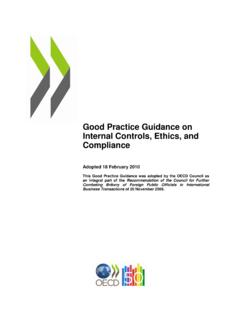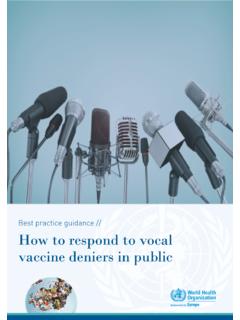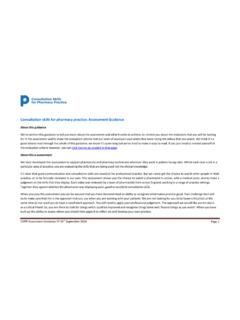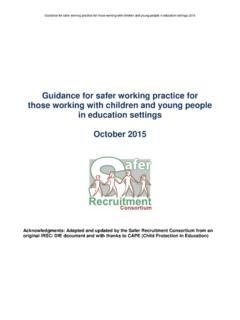Transcription of Assessing and supporting adults who (NRPF) (England)
1 Assessing and supporting adults who have no recourse to public funds (NRPF) (England) Practice guidance for local authorities February 2018 1 Contents 1 Introduction .. 5 Who has NRPF? .. 5 What are public funds ? .. 7 Good practice points .. 8 2 Pre-assessment screening .. 10 Responsibility for meeting needs .. 10 Establishing ordinary residence .. 11 No settled residence or in urgent need .. 11 Hospital in-patients .. 12 Out of area placements .. 12 Section 117 aftercare placements .. 13 People in detention and on release .. 13 Carers .. 14 Checking immigration status .. 14 Immigration documentation non-EEA nationals .. 14 Continuing leave (3C leave) .. 15 EEA nationals and family members .. 16 How to request a Home Office status check .. 16 Exclusions from support .. 17 Duty to inform the Home Office.
2 18 People who are not excluded from support .. 19 Meeting urgent needs for care and support .. 19 3 Eligibility for care and support .. 21 Well-being duty .. 21 Duty to assess .. 22 Needs assessment .. 22 Care and support eligibility criteria .. 23 Exception: needs arising solely from destitution .. 25 4 Meeting needs for care and support .. 27 Care provided by friends and family .. 28 Direct payments .. 28 Providing accommodation to meet needs .. 29 Home Office asylum accommodation .. 30 2 Right to rent scheme .. 31 Providing subsistence to meet needs .. 32 Financial assessments .. 33 5 Discretionary powers to provide housing .. 35 Considerations for using a discretionary 35 Section 19 of the Care Act 2014 .. 36 Pregnant women .. 37 Section 1 of the Localism Act 2011 .. 38 Establishing alternative housing options.
3 39 6 Hospital cases .. 41 Discharge procedure .. 41 TB treatment .. 42 Section 117 mental health aftercare .. 42 Responsibility for providing aftercare .. 43 Providing accommodation under section 117 .. 43 Referring for a Care Act assessment .. 44 7 Support for carers .. 45 8 Assessments when the exclusion applies .. 46 Human rights assessment .. 46 Determining whether a person can freely return .. 47 Legal barriers to return .. 48 Practical barriers to return .. 50 Determining a breach of human rights .. 51 Protection 52 Medical cases .. 52 Family and private life .. 55 Legal proceedings .. 55 Country information .. 56 Determining a breach of EU treaty rights .. 56 Concluding the human rights assessment .. 57 9 Refusing or withdrawing support .. 59 Complying with the Care Act following a grant of leave to remain.
4 59 People excluded from support .. 60 Home Office funded return .. 61 Local authority funded return .. 62 3 10 EEA nationals and family members .. 64 European Economic Area (EEA) countries .. 64 The right to reside .. 64 Family members .. 66 Benefit eligibility .. 67 Benefit eligibility table .. 68 Irish nationals .. 69 Returning British citizens .. 70 Difficulties asserting the right to reside .. 70 11 Asylum seekers .. 72 Local authority assessments .. 72 Referring to the Home Office for accommodation .. 72 Section 95 Home Office support .. 73 Section 4 Home Office support .. 73 12 Victims of trafficking and modern slavery .. 74 Safeguarding duty .. 74 National Referral Mechanism support .. 75 Local authority support .. 76 Care Act 2014 .. 76 Localism Act 2011 .. 76 13. Immigration information.
5 78 Making an immigration application .. 78 Application fees and exemptions .. 79 Fee waiver policy .. 79 Evidence of identity .. 81 Refusal of leave due to NHS debt .. 82 Leave to remain with NRPF .. 82 Next steps after recourse is obtained .. 84 Destitution Domestic Violence Concession .. 84 14 Legal aid and accessing legal advice .. 86 Eligibility for legal aid .. 86 Exceptional case funding .. 87 How to find a legal aid adviser .. 87 How to find an immigration or asylum adviser .. 87 Law centres and other free advice providers .. 88 4 15 Eligibility for other services .. 89 Work related welfare benefits .. 89 Housing association tenancy .. 89 Education and student finance .. 89 NHS treatment .. 90 Free and concessionary travel .. 90 Glossary .. 91 Endorsements, acknowledgements, disclaimer & terms of 5 1 Introduction This guidance is intended to provide a reference for local authorities in England to use in order to apply statutory duties and powers in relation to providing housing and financial support to vulnerable adults who have no recourse to public funds (NRPF).
6 This guidance provides information on the specific considerations that must be made when Assessing and meeting needs of person with NRPF under the Care Act 2014, applying discretionary powers, and implementing exclusions to support that affect people with certain nationalities and immigration status types. Practitioners must in all cases adhere to the Department of Health s Care and support statutory guidance , referred to here as the Statutory guidance .1 Social care is a devolved power and the Care Act 2014 applies to England only. The immigration legislation referred to applies to the UK so local authorities in Wales, Scotland and Northern Ireland may find this guidance useful in helping establish how to implement the exclusions and manage NRPF cases, but will need to refer to the relevant devolved social care legislation to find out how to assess and meet need: Section 35 of the Social Services and Well-being (Wales) Act 2014 Sections 12 and 13A of the Social Work (Scotland) Act 1968 Articles 7 and 15 of the Health and Personal Social Services (Northern Ireland) Order 1972 For information specific to Wales and Scotland, please refer to the respective briefings by the Welsh Refugee Council and COSLA: Single adult migrants.
7 Destitution, safeguarding and services under the Social Services and Well-being (Wales) Act 2014 (March 2017)2 Establishing Migrants Access to Benefits and Local Authority Services in Scotland (March 2012)3 Who has NRPF? No recourse to public funds (NRPF) applies to people who are subject to immigration control and, as a result of this, have no entitlement to certain welfare benefits, homelessness assistance and an allocation of social housing through the council register. The definition of subject to immigration control is set out in section 115 (9) of the Immigration and Asylum Act 1999 and applies to people with the immigration status types specified in the table below. 1 Department of Health, Care and support statutory guidance (17 August 2017) 2 3 6 A non-EEA national Examples Requires leave to enter or remain in the UK but does not have it Visa overstayer Illegal entrant Has leave to enter or remain in the UK which is subject to a condition that they have no recourse to public funds (NRPF) Spouse of a British citizen or settled person Tier 4 student and their dependants Leave to remain under family or private life rules see note A Has leave to enter or remain in the UK that is subject to a maintenance undertaking Adult dependent relative of a British citizen or person with settled status - see note B People with the following types of immigration status will have recourse to public funds.
8 Indefinite leave to enter or remain or no time limit (apart from an adult dependent relative see note B) Right of abode Exempt from immigration control Refugee status Humanitarian protection Discretionary leave to remain, for example: o Leave granted to a person who has received a conclusive grounds decision that they are a victim of trafficking or modern day slavery o Destitute domestic violence concession Limited leave to remain granted under family and private life rules where the person is accepted by the Home Office as being destitute see note A UASC leave Notes A. People with leave to remain granted under the family and private life rules, or outside of the rules, who are on a 10- year settlement route will have the NRPF condition imposed unless they can demonstrate to the Home Office that they are destitute, in which case, recourse to public funds will be granted.
9 They may also apply for their leave to be varied by applying to the Home Office for a change of conditions in order for the NRPF condition to be B. An adult dependent relative of a British citizen or person with settled status will have indefinite leave to enter or remain in the UK with a prohibition on claiming public funds for a period of five years, although they may apply for non-means tested benefits during this period. Once five years has passed, or if the person who made the undertaking has died, they will have full recourse to public 4 5 Regulation 2 & Schedule of the Social Security (Immigration and Asylum) Consequential Amendments Regulations 2000 ; Home Office Modernised guidance on Public Funds 7 When a person has leave to remain with NRPF, no public funds will be written on their immigration documents, for example a Biometric Residence Permit or Home Office letter.
10 If there is no such statement then it can be assumed that a person does have recourse to public funds, although they would need to satisfy the relevant benefit or housing eligibility requirements in order to access these. European Economic Area (EEA) nationals and their non-EEA family members (who are lawfully present by having a right to reside or derivative right to reside in the UK) are not subject to immigration control under section 115 of the Immigration and Asylum Act 1999. They are not excluded from claiming benefits and housing assistance. However, where they are ineligible for these because they fail the right to reside and/or habitual residence tests, they are often referred to as having NRPF. Immigration documentation issued to non-EEA family members with a right to reside or derivative right to reside will not make any reference to public funds.













